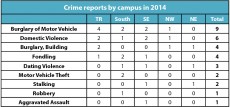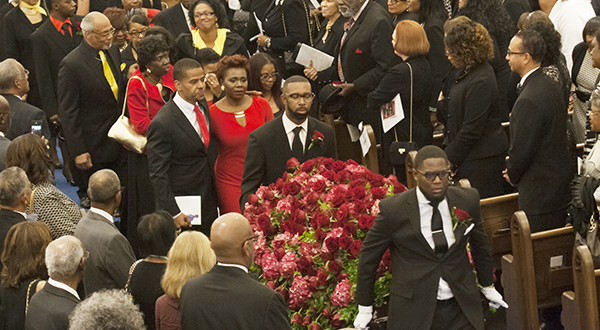By Jamil Oakford/ managing editor
The Tarrant County College police department released on Sept. 29 its annual security report for 2014, showing that the number of burglarized motor vehicles on South Campus decreased by more than half.
While most of the numbers were low districtwide in most of the reportable crimes listed, TR Campus did have more reports than other campuses.

Infographic by Hope Sandusky/The Collegian
Lt. David Herndon, who compiles reports across the district and puts together the district’s report, said South historically has had somewhat higher numbers than the other campuses.
“The department has done a good job being vigilant and working on some of those numbers,” he said.
In 2012, South reported 10 burglaries of cars. It dropped down to nine in 2013 and has dropped all the way to two reports last year.
These numbers may not be obvious at first glance, but Herndon said these reports help police districtwide evaluate what’s going on.
Not every campus waits for the annual report to be published to start working on some of those issues, Herndon said. Sometimes the issue is obvious, and police begin working toward a solution. But the reports are telling in some cases.
“They try to find the common denominator with the numbers shown on the report,” he said. “For example, on South, they brought in extra police to have more eyes on the parking lots.”
TR student support coordinator Kateeka Harris said the Clery Act makes reporting obligatory for all colleges and universities.
“Campuses are required to report crimes committed on campus or any property owned or rented by the institution,” she said. “Say if the college were to rent out a church space for use, that church is also considered a part of the campus.”
If the institution fails to report accurate information, under the Clery Act, it can be extremely costly.
“Every violation is $35,000 in fines,” Harris said.
Two crimes required to be reported under the Clery Act are stalking and fondling. In the annual security report just published, fondling was the most common with three out of five campuses having at least one reported case.
“Fondling is the unwanted touching of breasts or buttocks,” Herndon said. “Sometimes it’s as easy as students just not realizing that it’s unacceptable behavior.”
Herndon believes that they’ve reduced some of the stalking cases with the help of disciplinarians on campus.
“They really stepped in and helped with complaints from students,” he said.
Victim assistance is one of the resources available on campus.
“Anyone who’s a victim of a crime can seek help through victim assistance,” NE victim assistance advocate Keith Wilson said.
The services can range from offering information and referrals to resources around the community to helping them understand the criminal justice system.
Harris said these resources along with the annual security report are great things to have but lack student awareness.
“In reality, it’s not useful to students if they don’t know about it,” she said. “Most people don’t think to look. You don’t know what you don’t know.”
Harris says this is important as students think beyond their time at TCC.
“A good number of our students will transfer to other universities,” she said. “If they’re deciding to go to college and live away, that [security report] should be something they look at.”

























